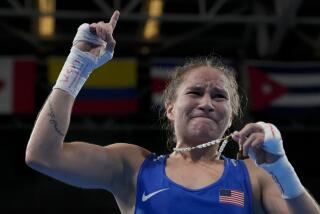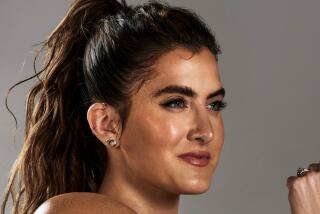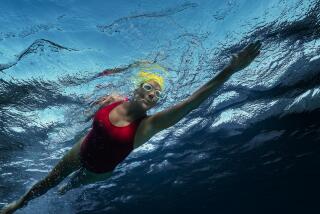Personal Triumph
- Share via
HAVANA — Laughter comes easily to Ana Quirot. Self-effacing jokes about men, her privileged friendship with Fidel Castro. But it doesn’t mask a fierce will to win that once saved the Cuban runner’s life and now has her bound for the Olympics.
“I may look calm. But inside, I’m a little restless,” she said, her ready smile revealing a hidden gold tooth. “The whole world wants me to win.”
Ana Fidelia Quirot already has. The former world champion in the 800 meters and 1992 Olympics bronze medalist has made a miraculous comeback from a 1993 fire that took the life of her unborn child and nearly her own.
A 37-year-old U.S. economic embargo of Cuba has isolated the country. Designed to punish Castro’s communist government, it has denied ordinary Cubans such luxuries as cars, meat, washers and stoves.
Cuba’s athletic elite hasn’t escaped the embargo’s impact. Like millions of Cubans do every day, Quirot was using a kerosene cooker to wash clothes in her kitchen when the fire occurred.
A mixture of isopropyl alcohol and water, which she was using to wash her clothes on the stove, flowed over the lip of the pot, down the sides and burst into flames.
For weeks she lay near death at Havana’s Hermanos Ameijeiras Hospital, burns covering a third of her body. Doctors induced labor to save the baby, conceived with her then-boyfriend, star high-jumper Javier Sotomayor. The girl died.
One blow followed another. Quirot’s former husband, freestyle wrestler Raul Cascaret, died in a car accident. It would take most of the year, one of searing pain, repeated skin grafts and surgery, before she could train again.
The scars on her face, arms and hands are healing but still evident. Fiddling with her braided, shoulder-length hair as she sits on the patio of her 11th-floor apartment, Quirot refuses to talk about what she calls “the event.”
“That’s in the past,” she said. “It’s better to speak of the present.”
For Quirot, the present means enjoying life as her country’s most popular and admired athlete.
A crowd of photographers surges around Quirot as she paces back and forth in the No. 4 lane at Havana’s Pan-American Stadium, hands on hips, pumping her legs before the 800-meter final at Cuba’s Olympic trials.
The gun fires and Quirot immediately hits her long stride, her shock of braids swinging back and forth. Two minutes and two seconds later, she crosses the finish line to cheers of “Ana! Ana!” from an adoring crowd.
Quirot knows she needs to shave about 5 seconds off that for a good chance at a medal in Atlanta. She isn’t worried. Weeks earlier she ran the 800 in 1:58.77 in Madrid, second-best time in the world this year.
The day before, she set a Havana meet record in the 400-meter finals in 50.42 seconds, eclipsing the old mark of 51.01 seconds.
Yet her coach, Leandro Civil, isn’t happy. He wants to see a 1:55 or 1:56 in the 800.
“Gorda! Gorda!,” he yelled, using Quirot’s childhood nickname of “Fatty,” trying to divert her attention from a cluster of reporters. “Enough with that already.”
“She’s tired,” Civil said, noting Quirot had returned from European competition only days before. “But I think she’ll get at least the bronze. She wants to win.”
Back in her apartment, with its view of red-roofed homes and Havana’s famed seaside Malecon boulevard, Quirot said it’s not yet time for her to show her best effort.
“I didn’t push it,” she said. “I’m only preparing for Atlanta.”
That preparation has been 20 years in the making.
Quirot is both a product of Cuba’s socialist system and, perhaps, its greatest exponent--after Comandante Fidel himself, for whom she is named. Adopted by the state system of sports schools at age 13, she was groomed and conditioned to become the world-class athlete that she is.
The 1987 Pan American Games 400 and 800 champion, she was the 1991 world champion silver medalist in the 800. She won a record 39 consecutive 800-meter finals between 1987 and 1990.
Last year, Quirot marked her successful return to international competition by winning the world 800-meter title in Goteborg, Sweden. She also won the 800 in the Atlanta Grand Prix meet in May.
Quirot is quick to thank Cuba’s advanced medical system and a support group of top doctors, psychologists, nutritionists and trainers who helped her through her recovery, her depression, her pain.
“I believe that I am a symbol of the Cuban revolution, of its achievements in education, in medicine and sports,” she said.
One of her first memories after the fire is of telling Castro in her hospital room that she would run again.
“I told him I will return and that I won’t let him down, nor the Cuban people,” she said.
Told that it’s been widely reported that she is Fidel’s favorite athlete, Quirot exclaims with a laugh, “Friends forever until death!”
“We all are favorites,” she added quickly. “But sure, Fidel always has had much support and sympathy for me.”
On a wall in Quirot’s apartment is a plaque signed by Castro, thanking her “for your grit, determination, honor in sport and patriotic spirit.” A nearby bookcase overflows with medals, ribbons and trophies. An Olympic teddy bear sits on a bed.
Did she ever fear that she wouldn’t run again?
“Never,” Quirot said. “You have to say, ‘This is going to happen. I intend to do it.’ If it doesn’t happen, well, that’s another thing. But you can’t have any doubts.”
While a medal in Atlanta will cap the comeback, Quirot eventually would like a family, a home, maybe two or three children.
For now, however, there’s little time for a boyfriend.
“Men take up too much attention,” she said jokingly. “And a Cuban man has too many women. We worry about that.”
Quirot said she wants to reach the finals in the 800. Not only does Cuba want her to make it; she demands it of herself.
“I feel a little under pressure because all of Cuba has expectations and is following every result,” she said. “The people always want more.”
More to Read
Go beyond the scoreboard
Get the latest on L.A.'s teams in the daily Sports Report newsletter.
You may occasionally receive promotional content from the Los Angeles Times.






